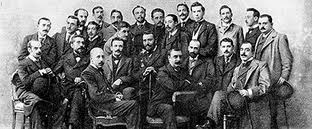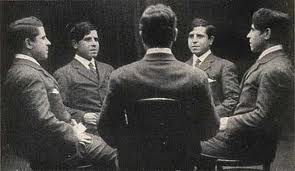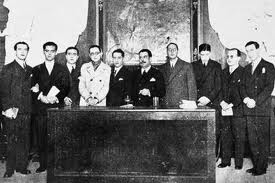Silver Age of the Spanish Literature
The Silver Age of Spanish literature is the name of the period between the end of the 19th century and the beginning of the Spanish Civil War, or to be more precise, from 1898 to 1936. It is called the Silver Age because it is a time of great literary works written in the Spanish language, and during this time there are three important generations of writers: the Generation of '98, the Generation of '14 and the Generation of '27, each with their own literary movements.
Modernism

Modernism starts in Latin America and makes its appearance in Spain in 1892 with the arrival of Ruben Dario. Modernists reject the reality they live in, especially the materialism of the bourgeoisie. They react against the imitation of reality which is so characteristic of Realism, and defend the value of impressions, sensations and the subjectivism of art. Modernism cultivates mainly the lyrical form, both in prose and verse. Its time of greatest splendor is during the first years of the 20th century, and it lasts approximately until the beginning of the First World War in 1914. Some experts think Modernism is directly opposite to the Generation of '98, and some think they stem from the same needs, but most agree that they have some common grounds.
Generation of '98

The Generation of '98 takes its name from the Disaster of '98, when Spain lost its colonies in the Philippines, Guam, Cuba and Puerto Rico. The authors of this generation feel the need to show their discomfort with their society in a very direct manner, through opposition and criticism. Their works are a reflection of Spain's situation and the causes for its decadency. The austerity of the Castilian landscape is a representation of the true essence of the Spanish soul, and this is seen in their works by the use of clear and easy language. Most of the authors of the Generation of '98 wrote mostly prose, either in narrative form or in essay form. There are around 11 authors that are considered members of this group. Just some of the great names among them include Miguel de Unamuno, Enrique de Mesa, Ramiro de Maeztu, Azorín, Antonio Machado, the brothers Pío and Ricardo Baroja and Ramón María del Valle-Inclán.
Generation of '14 and Novecentismo

Several authors appear during the second decade of the 20th century with a more European and rational mentality. These authors group around José Ortega y Gasset, who was a Spanish philosopher and essayist, and are called "Novecentistas" or the Generation of '14. The "Novecentismo" movement (Noucentisme, as it's called in Barcelona, where most of the writers are from) arises from the necessity of making a break with the aesthetics of the previous century (1800). Their difference with the Generation of '98 is that they defend the Europeanization of Spain, and they also criticize the exaltation of feeling and the subjectivity of art. Among the authors of this generation, there are some that stand out, such as José Ortega y Gasset, Ramón Pérez de Ayala, Gabriel Miró and Juan Ramón Jiménez.
Generation of '27

The Generation of '27 is composed by a series of authors born mostly during the 1890's and who feel a great admiration for Juan Ramón Jiménez, a poet from the Generation of '14. The name comes from the tribute they organized in 1927 for Góngora, marking the third century since his death. The main characteristic of this generation is the search of pure art and artistic experimentation. The Generation of '27 is responsible for some of the most brilliant works of contemporary literature, especially in the lyrical genre, which was preferred by most of the writers. Although all of these authors had quite different literary careers and don't share much in terms of style, the common characteristic to all of them is the will to integrate the avant-garde with tradition. Some of the authors of this generation are Federico García Lorca, Rafael Alberti, Luis Cernuda, Pedro Salinas, Jorge Guillén, Gerardo Diego and Vicente Aleixandre.
The Silver Age of Spanish literature is a very important period for contemporary literature as a whole, and it is therefore one of the key subjects for those who learn Spanish.

